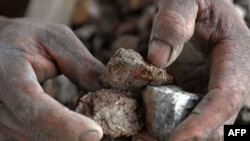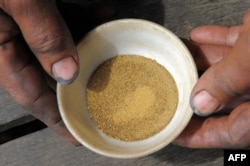The company first came for Yim Sophat’s land in 2016, claiming her rice field and cashew orchard weren’t hers at all, despite her land title and years spent farming the plot in Preah Vihear province in northern Cambodia.
The 61-year-old joined her dispossessed neighbors in filing complaints with village, district and provincial officials. Then they took the dispute to the courts and to the Cambodian government’s Anti-Corruption Unit, arguing that only bribes could explain the official inaction.
“There was no answer,” she told VOA Khmer this month. “Whether the land is valuable or not, there should be a resolution for them so [villagers] can find other land. But there was nothing.”
Yim Sophat said she now survives by walking through the forest and harvesting rattan reeds, which she trades for rice to eat.
“The cashew trees were bulldozed away,” she said. “I’m very miserable.”
On the other side of the dispute was Delcom (Kampuchea) PTE, which villagers were told has a license to explore and extract gold from some 1,800 hectares of land in the province’s Rovieng district. Among its reported shareholders is Hing Bun Heang, head of the powerful Prime Minister Bodyguard Unit.
Yim Sophat’s experience typifies the dangers posed by the fledgling industrial gold mining sector in Cambodia, according to a new report from Equitable Cambodia, a non-government natural resources watchdog.
The report — “A Snapshot of the Gold Mining Industry in Cambodia: Rights Violations, and Environmental Damage” — notes that a government official in 2007 touted the industry’s promise of reducing reliance on donor aid and funding everything from schools to infrastructure and social programs.
As companies have ramped up extraction in recent years, there’s little evidence of significant benefits to local communities or the state budget, it says. Most of the companies operating in the sector are defined by scant public profiles and apparent links to ruling party powerbrokers.
“Since [2007], the corporate takeover of mining resources has continued steadily allowing many of the industry’s party-elite progenitors to maximize profits and exploitation of natural resources while effectively minimizing accountability,” Equitable Cambodia says in its report.
“The expansion, mechanization, and chemicalization of the industry has exponentially increased the risk of land grabbing, environmental damage, and occupational health and safety for Cambodia’s citizens and communities, especially Indigenous people,” it adds.
The Delcom site is among four case studies in the report, which also looks at sites in Ratanakiri, Mondulkiri and Kratie provinces. Locals in these areas have long done small-scale “artisanal” gold mining, a practice that is often banned once commercial interests move in.
The often indigenous communities Equitable Cambodia spoke with shared similar lists of grievances and demands. They say the mines have poisoned waterways with chemicals used to process gold, erased their traditional lands and livelihoods, and forced them to uproot their lives — often with little to no compensation in return, and no public engagement in the process.
The exception is Renaissance Minerals, a company listed on Australia’s stock exchange (ASX) that oversees the O’Kvau mining site in Mondulkiri’s Keo Siema district. Villagers reported that the company provided good jobs for Cambodian nationals, followed basic safety practices, provided health benefits and invested in local infrastructure — in contrast to a nearby mine owned by Chinese-controlled firm, Rong Cheng Industrial Investment (Cambodia).
“Villagers are largely happy with Renaissance Minerals, except for the company’s encroachment on their traditional lands and the lack of transparency around the company’s plans and activities early on,” the report says.
Renaissance Minerals purchased the Cambodian interests from Oz Minerals, another Australian company that admitted to paying bribes to Cambodian officials to secure the mining license. Renaissance Minerals merged with Emerald Resources NL, another ASX-listed firm, in 2016 and extracted its first gold from the O’Kvau site in 2021.
A company official declined to comment on specific claims made in the report.
“We note your email and the factually erroneous report and have forwarded both to the Cambodian Authorities for their information and action,” Alison Kerr, executive Assistant and Office Manager of Emerald Resources, wrote in an email to VOA Khmer.
Local villagers had almost nothing good to say about the Delcom site, by contrast, according to the Equitable Cambodia report.
The report said villagers were being pressured to accept compensation well below market rate for their land, and “threatened with forced eviction and zero compensation if they do not comply.” It said there was a campaign by authorities for indigenous communities to reject their cultural traditions. And it described the physical toll of the mining operations on locals.
“The interviews reveal that the community’s health has dramatically degraded over the past 5 years. Many villagers report increased incidences of cancer, swellings, abdominal pain, Alzheimer’s, nephritis, and tumors in the community,” it said.
Representatives for Delcom could not be reached on phone numbers listed in Cambodia’s corporate registry. VOA Khmer also reached out to Preah Vihear provincial officials for comment, but did not get a response.
At the national level, a person who picked up the telephone number for Minister of Mines and Energy Keo Rattanak told a reporter they had the wrong number. Ung Dipola, the ministry's director general, could not be reached for comment about the report.
Officials at the Ministry of Economy and Finance said last year that seven companies had active gold exploration licenses in the country, according to the Phnom Penh Post. Mining companies contributed $15 million to state coffers in 2022, they said, almost entirely coming from Renaissance Minerals.
Dipola told the Post in November 2022 that exploration activities were also underway in Tbong Khmum, Ratanakiri and Battambang provinces, and said additional mining licenses could be issued if there is “enough production potential.”
Mother Nature Cambodia, an environmental activist group, has for years campaigned for more transparency in the sector, while spotlighting the damage to local communities. Alejandro Gonzalez-Davidson, a co-founder of the group who is barred from Cambodia, said the commercial gold mines transform the populations and power dynamics when they arrive.
“Having this massive influx of workers from the outside at the very least will have an impact on their culture and tradition, on their language. Crime will go up. Local authorities will no longer care about their needs, it will all be about caring about the needs of the company,” he said.
Ultimately, the commercial mines force many people to move out, without land to farm or viable ways to make a living. Gonzalez-Davidson said there was a certain inevitability to commercial mining, but that Cambodia’s government was failing to ensure that the public reaped the benefits of exploiting public assets.
“Show everybody in the whole country how much money Cambodia is making, what are the taxes? What are the royalties? And be open about, you know, what is the positive impact on health and education of the province and of the country? You don't get any of that,” he said.
“So my biggest concern is, well, this is obviously making a lot of corrupt people very rich, while the Cambodian people are not seeing much or any of the benefits.”
A group of researchers from University of Wisconsin-Madison’s La Follette School of Public Affairs came to a similar conclusion in their report last year, titled “Increasing Transparency in the Extractive Industries in Cambodia.”
The authors said there is “significant potential” for gold mining revenues to benefit Cambodia, but that the industry also highlighted the “pitfalls” of Cambodia’s extractive industry, in which the “historical trend is one of opaque rather than transparent data.”
Jennifer Morzfeld, one of the authors, said gold mining was less environmentally devastating than some other extractive industries, such as sand dredging in the Mekong River, but also was not as abundant as other extractive resources.
“All of this is to say that in general, gold mining in Cambodia does have the potential to provide a significant economic boost in terms of national revenues and job creation, but there are environmental challenges that can harm the way of life in Cambodia that the government needs to better compensate,” she said in an email to VOA Khmer.
She said non-government groups in Cambodia — including Open Development Cambodia, which commissioned the report — were applying sustained pressure on officials to increase transparency in the sector.
“There is also greater external pressure that is encouraging more open government practices, like the opportunities for foreign direct investment or the chance to join international organizations that can bring in more national revenue and raise the standard of living in Cambodia across the board,” she added.
Tun Mean, another villager in Rovieng district, said he has watched Delcom’s mining operations gradually expand since 2014. He said his own farmland has been affected by the pollution leaching out from the site into local waterways.
"It affects the farmland, the people, and it affects natural resources and causes water pollution," he told VOA Khmer.
What Tun Mean hasn’t seen is improvements to help offset the damage, like new schools, roads or bridges.
"Well, it looks like we don't have the right infrastructure yet," he said.









